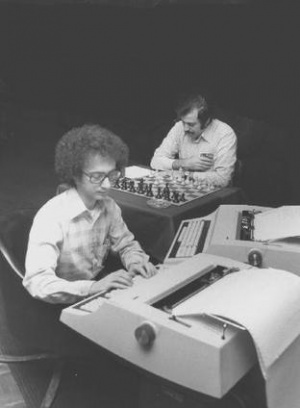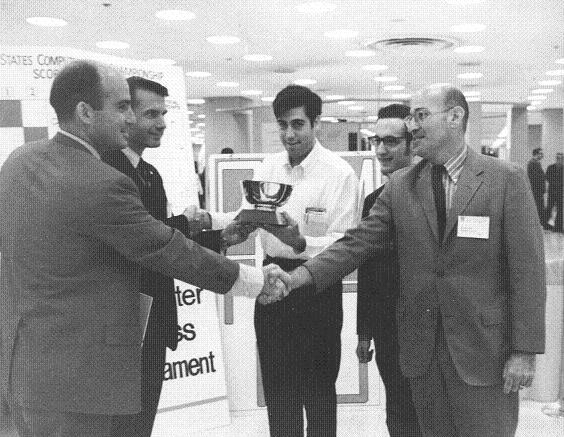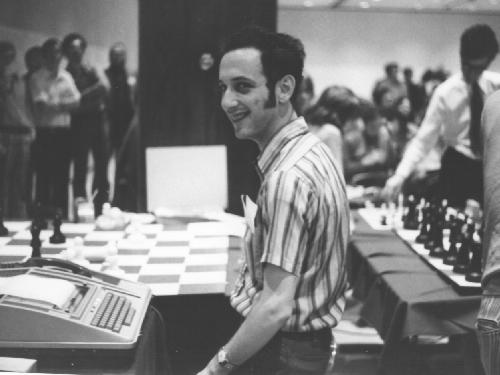Larry Atkin
Lawrence R. (Larry) Atkin,
an American computer scientist, former chess programmer and consultant. Along with Keith Gorlen (1968), David Slate (1969) and CDC Cyber hardware consultant David Cahlander, Larry Atkin was the initial author of the Northwestern University's program Chess, which almost dominated computer chess during the 70s in the United States. Larry Atkin further was lead programmer at Odesta aka Helix Technologies and co-creator of the Helix database and is now consultant at QSA Toolworks [2] and various companies [3].
Contents
Photos
David Slate accepts first prize from ACM president Sam Matsa for winning the ACM 1970
with his and Larry Atkin's Chess program. Monty Newborn (far left), Ben Mittman (far right) [4] .
Larry Atkin during the David Levy simultaneous exhibition against 12 computers at ACM 1975 [5]
Chess 0.5
In 1978 Larry Atkin wrote a didactic program in Pascal along with Peter W. Frey, which was published as Chess 0.5 in the Byte Magazine [6], and re-published on-line in 2005, available from Scott A. Moore's sites [7][8].
Applied Concepts
In the '80s Larry Atkin worked for Applied Concepts on dedicated chess computers and is mentioned along with David Slate as co-author of the Gruenfeld and Capablanca module programs for the Great Game Machine and the Chafitz modular game system . He is further sole author of the Steinitz Edition 4 [9] [10], and the Steinitz Encore [11], both running on a 8-bit 6502 processor with 2 resp. 4 Mhz. Capablanca was later converted to be Chess 7.0 for the Apple II, Atari 800, and Commodore 64 published by Odesta. Even later it became "How About a Nice Game of Chess" for the Apple IIe [12] [13]. Along with Peter W. Frey, Larry Atkin is co-author of the Othello program Odin, which also ran as module of the Great Game Machine.
Selected Publications
- David Slate, Larry Atkin, Keith Gorlen (1971). CHESS 3.5 User Guide. Northwestern University
- Larry Atkin (1975). Chess 3.6: A Chess Playing Computer Program. Masters Thesis, Northwestern University, June 1975
- David Slate, Larry Atkin (1977). CHESS 4.5 - The Northwestern University Chess Program. Chess Skill in Man and Machine (ed. Peter W. Frey), pp. 82-118. Springer-Verlag, New York, N.Y. 2nd ed. 1983. ISBN 0-387-90815-3. Reprinted (1988) in Computer Chess Compendium
- Peter W. Frey, Larry Atkin (1978). Creating a Chess Player. An Essay on Human and Computer Chess Skill, BYTE, Vol. 3, No. 10, pp. 182-191. pdf from The Computer History Museum
- Peter W. Frey, Larry Atkin (1978). Creating a Chess Player, Part 2: Chess 0.5. BYTE, Vol. 3, No. 11
- Peter W. Frey, Larry Atkin (1978). Creating a Chess Player, Part 3: Chess 0.5 (continued). BYTE, Vol. 3, No. 12
- Peter W. Frey, Larry Atkin (1979). Creating a Chess-Player, Part 4: Thoughts on Strategy. In Blaise W. Liffick (ed.), The Byte Book of Pascal, pp. 143-155. Byte Publications, also BYTE, Vol. 4, No. 1
External Links
- Larry Atkin | LinkedIn
- Larry Atkin's ICGA Tournaments
- Commodore 64/128 Old Computer Chess Game Collection - Chess 7.0 from The Spacious Mind
- Atkin, Larry from Schachcomputer.info Wiki (German)
References
- ↑ Larry Atkin (front) and David Slate at the 10th ACM North American Computer Chess Championship in Detroit, Michigan, 1979, Gift of Monroe Newborn from The Computer History Museum
- ↑ QSA ToolWorks, LLC Home Page
- ↑ Larry Atkin | LinkedIn
- ↑ Slate and Atkin win 1st World Computer Chess Championship in New York City, New York 1970, Photo with courtesy of Monroe Newborn, from The Computer History Museum
- ↑ Atkin at 6th ACM North American Computer Chess Championship in Minneapolis, 1975, Photo by Monroe Newborn from The Computer History Museum
- ↑ Larry R. Atkin Magazine articles
- ↑ Chess 0.5, Release 1 - 2005-05-30
- ↑ Byte Chess 0.5 source code
- ↑ Chafitz Steinitz Edition from Schachcomputer.info Wiki (German)
- ↑ Wilhelm Steinitz from Wikipedia
- ↑ Chafitz Steinitz Encore from Schachcomputer.info Wiki (German)
- ↑ chess 7.0 by Will Singleton, CCC, October 16, 2008
- ↑ Commodore 64/128 Old Computer Chess Game Collection - Chess 7.0 from The Spacious Mind


